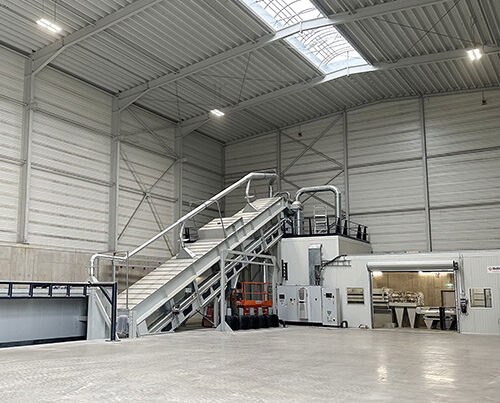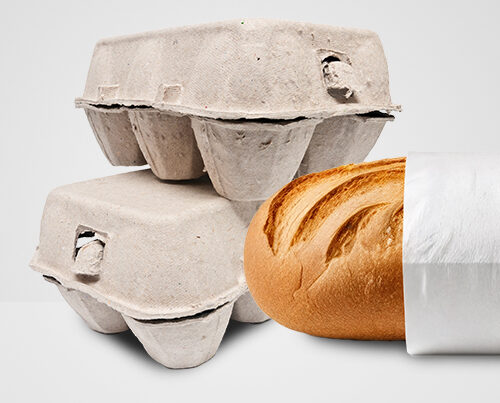A medley of drums and horns rolls through Düsseldorf’s old city centre like a wave. People are milling about in the streets wearing every possible kind of fancy dress costume. It is carnival time and the whole town has turned out! Every year, Düsseldorf is taken over by carnival goers – aka the ‘Jecken’ – from ‘Weiberfastnacht’ (the Thursday before Lent when women traditionally go out and celebrate) through to Ash Wednesday. And large volumes of waste are generated wherever these clowns, princesses and cowboys get together. Sounds a bit of an exaggeration? Not really.
In the past, drinks cups and food packaging were often carelessly thrown away – and not in the litter bins provided but on the ground in the streets and parks. This was not just bad for the environment; it also meant a lot of work for those having to clear up afterwards. And so, the City of Düsseldorf reacted by deciding that all events held in its public areas must use reusable packaging. A decision that not only affects carnival but its Rhine Fair, Japan Day and Christmas market as well.
In a nutshell
Working together with AWISTA and REMONDIS, Düsseldorf has introduced a mandatory system that ensures that only reusable packaging may be used at large events put on in the city. Gradually implemented since 2022, it has been obligatory to use reusable food and drinks packaging since 2024. The stand owners all use the same pool system and REMONDIS is in charge of cleaning the products and logistics. The packaging can be handed back at any of the stands. This is an important step to reducing waste caused by single-use products, to having cleaner events as well to creating a well-functioning circular economy.
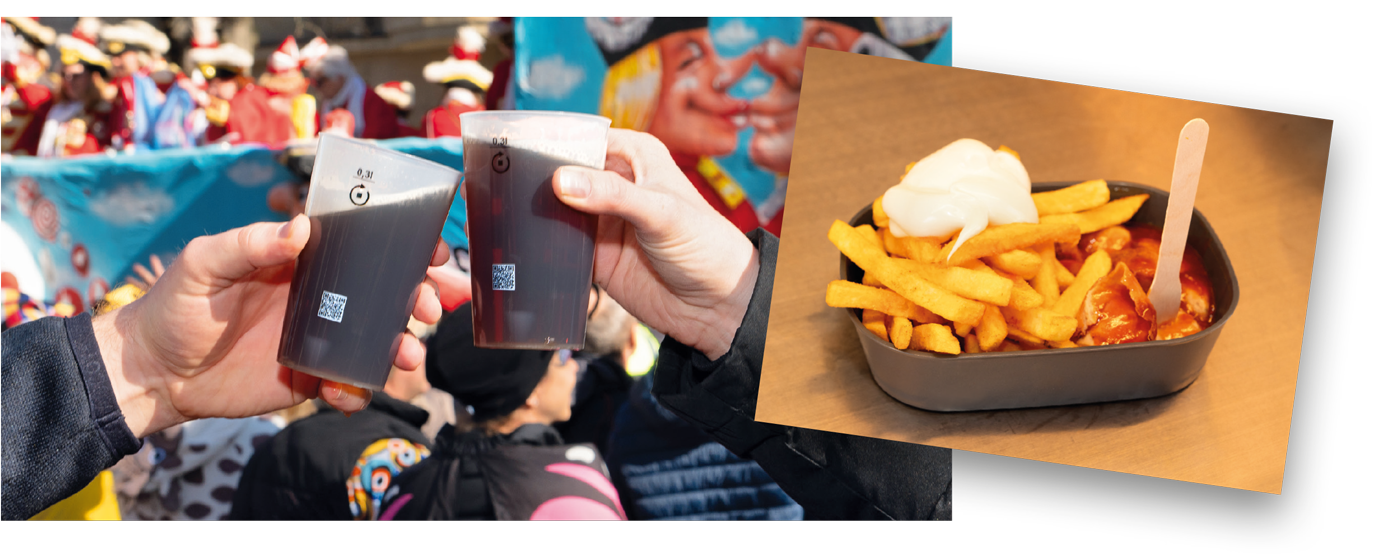
Heading towards a ban on single-use products
Even though the primary goal set out in the German Circular Economy Law [KrWG] is to prevent waste, the volumes of waste packaging continue to rise across the country. Germany produces 237 kilos of packaging waste per capita per year, putting it among the countries topping the list in the EU. People consuming more and more food and drink outside their homes is one of the factors driving this growth. According to Environmental Action Germany [DUH], 5.8 billion takeaway cups, 4.5 billion takeaway food boxes and 2.7 billion to-go plates are used just the once and then thrown away every single year – and these are just the figures for Germany.
According to Environmental Action Germany [DUH], 5.8 billion takeaway cups, 4.5 billion takeaway food boxes and 2.7 billion to-go plates are used just the once and then thrown away every single year in Germany alone.
Many rules and regulations have been brought in, both at national and EU level, over the last few years to tackle the problem of waste caused by discarded single-use products. Some of them have lived up to expectations, while others – such as the law mandating restaurants to offer alternative, reusable to-go packaging – have not yet had the desired effect. A number of local authorities have responded by focusing more on regional projects that have a fixed framework, namely public events. Why? Because it is easier to impose the rules here than it is in the takeaway market. Furthermore, festivals and markets are local showpieces that promote cohesion and strengthen tourism. Action needs to be taken if the one thing that remains in everyone’s mind is not the fun they had but the image of overflowing bins and trampled plastic cups. What’s more, in many cases the waste does not remain where the product was bought but ends up littering neighbouring areas, such as parks and riverbanks.
As a result, Düsseldorf has decided that food and drink must be handed out in reusable to-go packaging at public events. Single-use packaging may no longer be used. It based its decision on Section 5, Paragraph 2 of the City of Düsseldorf’s waste management by-law, which was passed in 2020 to promote reusable packaging.
However, this is not something that the city authorities can implement either overnight or by themselves. Leonhard Krause, Düsseldorf council’s zero-waste manager since 2022, coordinated and led the introduction of this reusable packaging regulation. “Right from the start, we felt it was important that there was a level playing field for everyone involved. How can we succeed in doing this together? There’s no point simply trying to ram things through.” And so, he began discussing this with different people. First with the individual stand owners and then – because it was pretty small scale – with the event organisers.
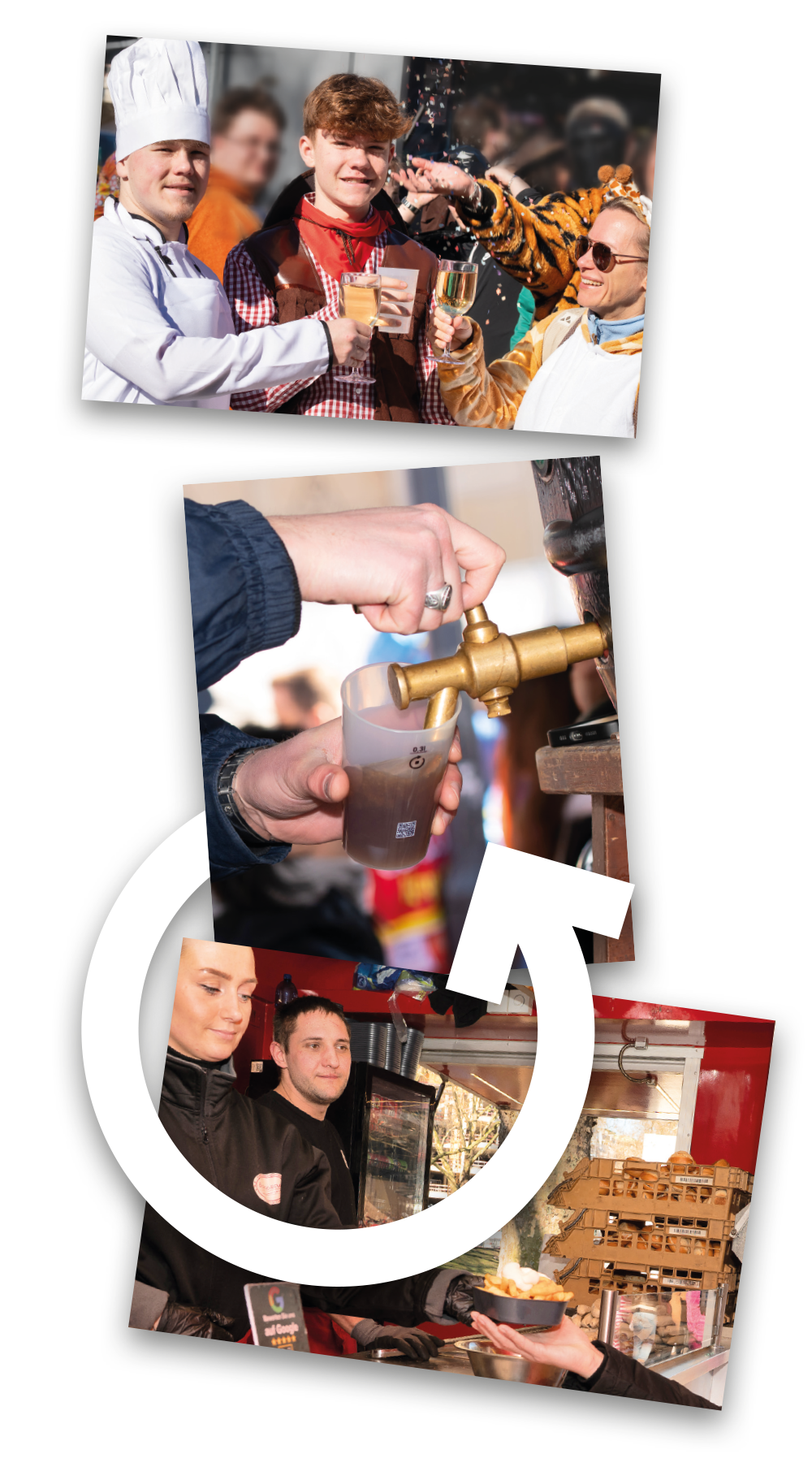
Short routes work best
One piece of the puzzle was still missing however: “Talk to your local waste management firm. See whether they can help with this reusable packaging scheme,” Leonhard Krause recommended. Having a problem solver on hand is also useful for coordinating actions between the stand owners and the event organisers. These short routes are worth their weight in gold in Düsseldorf – especially as the waste management firm AWISTA is always present at such events. “Three of our employees coordinate waste collection and street cleaning at public events,” explained Giann-Luca Maßmann. Moreover, AWISTA is part of a strong group and can access further services: “We can offer a full package of services with our partner REMONDIS.” There is no problem about dividing up the tasks: AWISTA is responsible for contacting the event organisers and restaurant businesses, taking the orders and dealing with the invoicing. REMONDIS provides the reusable to-go packaging and is in charge of the logistics as well as cleaning the cups and plates.
“We can offer a full package of services with our partner REMONDIS.”
Giann-Luca Maßmann, AWISTA
During the actual event, the stand owners pick up the reusable to-go products from the distribution points and return them there afterwards. REMONDIS cleans the cups and plates etc either on site or at its washing facilities and, if required, hands them out again. Visitors can hand in their reusable to-go products at any of the stands at the event. Having a uniform reusable product scheme where everyone uses the same solution was the easiest system to implement: “This prevented the event turning into a patchwork of different schemes where everyone did their own thing,” Giann-Luca Maßmann continued.
The scheme was then gradually introduced, bit by bit, once all the partners were on board: part of this concept was implemented for the first time in 2022 when it became obligatory to offer reusable alternatives. One year later, it became mandatory for drinks to be handed out in reusable cups. The Rhine Fair has always been a pioneer in this area and had already introduced a comprehensive ban on single-use, to-go packaging back then. Since the beginning of 2024, both food and drinks may only be sold in reusable, to-go packaging and, by the summer of 2024, all large events had switched over completely to reusable products. The only exceptions that can still be found are serviettes, greaseproof paper and cone-shaped sweet bags. “If minimalist packaging is needed to implement this reusable packaging requirement across the board, then this is a concession we are happy to make,” Leonhard Krause concluded.
Reusable to-go packaging – still spoiled for choice
Once the coffee has been drunk and the food eaten, then the cup and bowl should be left behind. On 01 January 2023, a law came into force across Germany to promote the use of reusable packaging and reduce the volumes of single-use, to-go packaging that are being carelessly thrown away. This regulation mandates that restaurant businesses selling takeaway, ready-to-eat food in single-use packaging and/or drinks in single-use cups must offer their customers alternative reusable packaging. This rule does not apply to businesses with five or fewer employees and a sales area of less than 80m². If requested, though, these businesses must use containers brought in by their customers for their takeaway food.
In most cases, customers must pay a deposit on the alternative reusable packaging and return it after they are finished with it. Most restaurants now offer such alternatives. However, they rarely market them to their customers so that many people continue to use the single-use option – perhaps because they feel it is more convenient or hygienic or simply because they do not realise there is a different kind of packaging available. And, as checks are not being carried out everywhere, there are still businesses that are not following the rules. As long as there is a choice, reusable packaging will always draw the short straw …
Copycats welcome
Around four million people visit the 10-day Rhine Fair and 700,000 carnival goers turn up to watch the carnival procession on Rose Monday. By making it obligatory to use reusable, to-go packaging, the City of Düsseldorf has succeeded in making its events more sustainable and in further improving the city’s overall appearance. A quick glance at a map of Germany shows that a number of both small and large councils wish to switch over to reusable packaging in the future and are adding reusable packaging to their waste management by-laws. Many, however, are just starting out on this journey. Mülheim’s waste management firm MEG (Mülheimer Entsorgungsgesellschaft) has, therefore, decided to lead the way and has already developed its own reusable packaging scheme. REMONDIS is supporting MEG with the cleaning and logistics. The subject of reusable packaging has at least been written into Oberhausen and Essen’s waste management by-laws. WBO Wirtschaftsbetriebe Oberhausen and EBE (Entsorgungsbetriebe Essen) – both waste management businesses – are there to help them implement such schemes if required.
“Düsseldorf is spearheading the way here in Germany. We hope that the way they hold their events will act as a role model and that other local authorities will decide to implement similar concepts,” commented Roland Lenders, managing director of REMONDIS Resource Management GmbH.
He and his colleague Johannes Hatting are in charge of developing schemes involving reusable, to-go packaging – for local authorities, restaurants, festivals and sports clubs. And he is always open to holding constructive discussions. At the end of the day, taking the reusable packaging route is a task that everyone must get involved in!
(Left) Johannes Hatting (REMONDIS) and (right) Giann-Luca Maßmann (AWISTA)
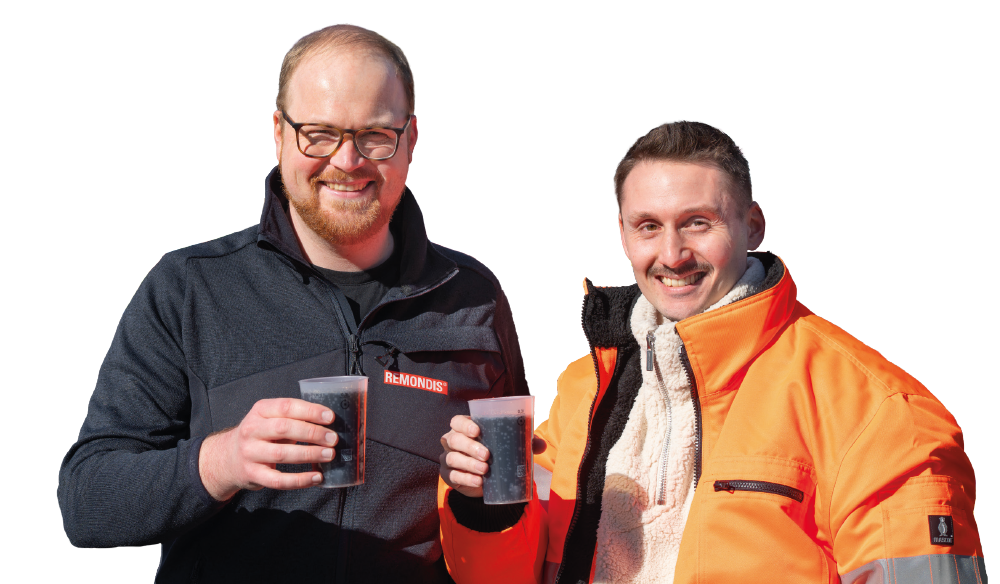
A discussion with two experts
Roland Lenders and Johannes Hatting from REMONDIS Resource Management GmbH have already helped a number of partners to introduce reusable, to-go packaging schemes.
RE:VIEWS: You deal with the subject of reusable, to-go packaging every single day. What’s the situation like at the moment?
Roland Lenders: Well, we see many interesting ways of approaching this subject and different target groups but there is still a long way ahead of us. So far, reusable, to-go packaging schemes have only worked on a grand scale in stadiums and at concerts and festivals as they have the right conditions in place. Many football stadiums have been using reusable cups for a long while now. It is also a matter of people getting used to using them.
RE:VIEWS: Have you got a concrete example of this?
Johannes Hatting: We entered into a collaboration with the football club Rot-Weiss Essen in 2024. Since then, the stadium has only handed out reusable cups, which we wash in our hygienic washing centre and prepare them for the next event. The fact that they hold regular matches makes it easier for us to plan ahead.
Most of the food there, however, is still served using single-use packaging. We’re currently discussing this with a number of partners and hope to be able to offer a full package of reusable cups and reusable food packaging in the stadium soon.
“Ultimately, it all has to do with how the market is regulated. Stricter rules mean more opportunities for reusable packaging.”
Roland Lenders, REMONDIS Resource Management GmbH
RE:VIEWS: What’s the situation like in other areas?
Johannes Hatting: There’s room to develop concepts in other areas as well. A new market will open up if restaurant chains move over to reusable to-go packaging for their burgers and chips. But there are other areas that offer exciting opportunities as well and where some progress has been made – for example, plant pots and cosmetics packaging.
Roland Lenders: Ultimately, it all has to do with how the market is regulated. Stricter rules mean more opportunities for reusable packaging. We can’t wait to see the direction that this market will end up going in. Being a service provider, we already have a broad set-up and are, of course, interested in all areas and all target groups!
Municipal packaging levies: Tübingen shows how to do it, Cologne to follow suit
A further lever for promoting reusable packaging is currently spreading across Germany: the municipal packaging levy. On 01 January 2022, the City of Tübingen imposed a levy of 50 cents on single-use packaging and disposable tableware as well as 20 cents on disposable cutlery. This levy must be paid by restaurants and shops that sell ready-to-eat food in single-use packaging. The city council has said that it makes no difference what material the disposable products are made of. Each business can decide whether they cover the cost themselves or pass it on to their customers.
A fast-food restaurant in Tübingen was not prepared to accept this levy. Its complaint, however, was rejected by the German Federal Constitutional Court at the end of January 2025 – creating a clear legal foundation for other towns. Following the court ruling, some local authorities have already started looking at the possibility of introducing such a levy. Others fear the administration expenses and general costs will be too high. A survey of local authorities and ministries carried out by the dpa revealed that the majority would like there to be a national regulation. One thing is clear: the packaging levy has prompted much discussion!
And there will soon be a ‘big’ copycat. What has worked well in the small town of Tübingen is now to be introduced in a major city: two political parties in Cologne (CDU and the Greens) put forward a white paper proposing the ‘introduction of a packaging levy in Cologne based on the Tübingen model’ – a proposal that was approved by the majority of the city council.
Image credits: image 1: Adobe Stock: Jiranath; images 2–6, 8: © REMONDIS; image 7: Adobe Stock: Ekkarat_Studio







